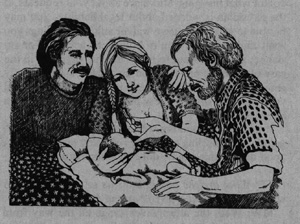This conversation took place in a most interesting fashion. It began on the day of the San Francisco Marathon, July 9, 1978. Michael Witte and I had just completed the twenty-six-plus miles and were soaking away our aches and pains in the Medical Self-Care Magazine office hot tub. We were getting into some interesting things about birthing, so I brought the tape recorder out by the tub and turned it on.
Medical Self-Care Magazine's women's health editor Carol Berry listened to the tape, agreed that it would make a good article, and suggested that she conduct a follow-up interview with Dr. Witte and Heidi Bednar, a midwife who works with Michael. She did, and it broadened and deepened the original interview immensely.
Finally, I edited the two transcripts and dovetailed them together, so that somewhere in the middle Carol and Heidi appear and I disappear. I guess you could call it collaborative journalism.

TF: Michael, you were saying that many people are thinking and feeling differently about having their babies than they did five years ago?
MW: Yes. Many, many more people are actively looking for just the right person to attend their birth. People are much more concerned with the environment in which the birth will take place. The underlying concept seems to be that the mother, the pregnant woman, should command a lot of respect. Prospective parents are getting more assertive about wanting things done their way.
TF: Has that concern for people’s individual preferences been lacking?
MW: I think it has. Both I myself and the group I work with are constantly being approached by people who haven’t been able to find the kind of prenatal care and deliveries they wanted. They're determined to create a way to have their own birth experience meet their needs.
People are becoming much more deeply involved with the birthing experience than they've ever been. They're realizing that there's an independent, benign force at work changing a pregnant woman's life and her body in monumental ways, and there's a widespread feeling that those changes need to be respected by health workers, by her man, by her friends, and by herself. She's different than she was before she was pregnant, and she gets more different the more pregnant she gets.
TF: I certainly didn't hear anything about any of that in medical school. We just learned about all the possible complications.
MW: Yes. The medical professions have focused almost exclusively on the technology. We've really approached childbirth as though it was a diseased state, full of potential complications. The technology of childbirth has been kept as secret and magical tools to be used only by physicians.
The technology has saved a lot of lives, but it's been controlled by the obstetricians, nearly all of them men, which created a built-in insensitivity, and birthing got dragged into the hospitals. Human values were subjugated to the hospital routine, with delivery rooms modeled on operating rooms, even though birth is not really very much like surgery at all.
TF: All right, suppose you're talking to a couple thinking about having a baby. What are the choices they should start taking into consideration? What are their alternatives? When should prospective parents start looking for someone to attend their birth
MW: When you're planning a pregnancy is an excellent time. You have a lot more time to explore options. Certainly by the time you first find you are pregnant.